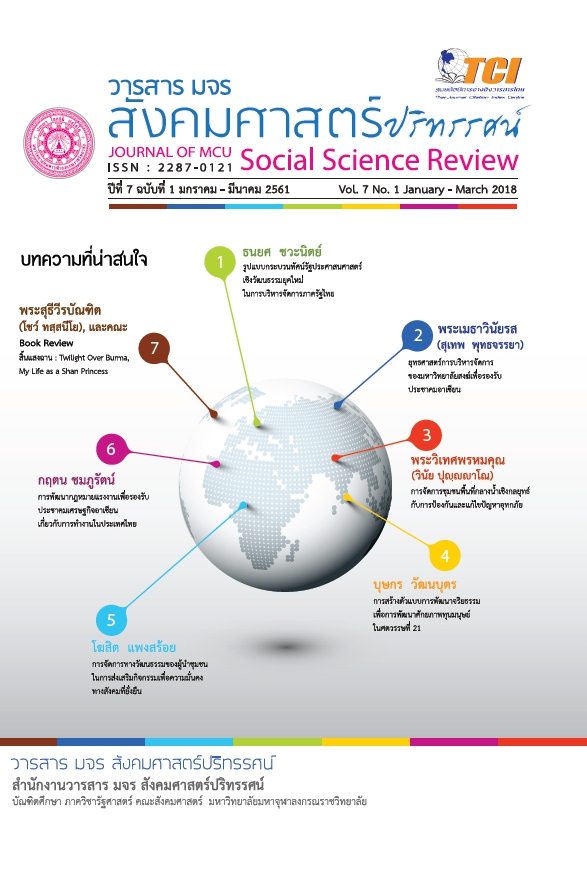ยุทธศาสตร์การบริหารจัดการของมหาวิทยาลัยสงฆ์เพื่อรองรับประชาคมอาเซียน
คำสำคัญ:
ยุทธศาสตร์การบริหารจัดการ, มหาวิทยาลัยสงฆ์, ประชาคมอาเซียนบทคัดย่อ
บทความนี้วัตถุประสงค์ 2 ประการ คือ 1) เพื่อศึกษาสภาพปัจจุบัน ปัญหา และความต้องการในการบริหารจัดการมหาวิทยาลัยสงฆ์ และ 2) เพื่อเสนอยุทธศาสตร์การบริหารจัดการมหาวิทยาลัยสงฆ์เพื่อรองรับประชาคมอาเซียน เครื่องมือที่ใช้ ได้แก่ แบบสอบถามโดยศึกษาจากบุคลากรของมหาวิทยาลัยสงฆ์ทั้ง 2 แห่ง คือ มหาวิทยาลัยมหามกุฏราชวิทยาลัย และมหาวิทยาลัยมหาจุฬาลงกรณราชวิทยาลัย จำนวน 357 คน และแบบสัมภาษณ์แบบมีโครงสร้างโดยศึกษาจากผู้ทรงคุณวุฒิทั้งภายในและภายนอกมหาวิทยาลัย วิเคราะห์ข้อมูลโดยใช้สถิติพรรณนา ค่าร้อยละ ส่วนเบี่ยงเบนมาตรฐาน และการสังเคราะห์เนื้อหา
ผลการวิจัย พบว่า สภาพปัจจุบันในการบริหารจัดการของมหาวิทยาลัยสงฆ์เพื่อรองรับประชาคมอาเซียนโดยภาพรวมอยู่ในระดับปานกลาง เมื่อพิจารณาเป็นรายด้านทั้ง 5 ด้านพบว่า ด้านวิชาการ อยู่ในระดับมาก และอยู่ในระดับปานกลาง 3 ด้าน คือ ด้านงานบริหารทั่วไป ด้านงานงบประมาณ และด้านโครงการสร้างบริหาร ส่วนด้านบุคลากร อยู่ในระดับน้อย จากข้อมูลดังกล่าวแสดงให้เห็นว่าสภาพการบริหารจัดการของมหาวิทยาลัยสงฆ์ในปัจจุบันยังไม่รองรับประชาคมอาเซียน ทั้งนี้ปัญหาเกิดจากโครงสร้างการบริหารยังเป็นแบบเดิมไม่ทันสมัย ผู้บริหารไม่ได้พิจารณาบุคลากรตามความรู้ความสามารถ งบประมาณมีจำนวนจำกัดและการจัดสรรงบประมาณไม่กระจายทำให้การปฏิบัติงานไม่เป็นไปตามแผน ดังนั้น สิ่งที่บุคลากรมีความต้องการจึงได้แก่การปรับปรุงระบบโครงสร้างการบริหารงาน และกฎระเบียบต่าง ๆ ของมหาวิทยาลัยให้มีความยืดหยุ่นไม่ซ้ำซ้อน เน้นการบริหารทรัพยากรมนุษย์ รวมทั้งพัฒนาระบบการบริหารจัดการที่เป็นกระบวนการมุ่งเน้นกลยุทธ์การบริหารงานภาครัฐสมัยใหม่ภายใต้หลักธรรมาภิบาลและสอดคล้องกับประชาคมอาเซียน
ส่วนยุทธศาสตร์การบริหารจัดการมหาวิทยาลัยสงฆ์เพื่อรองรับประชาคมอาเซียน
มีดังนี้ (1) ผลิตและพัฒนาบัณฑิตให้เป็นเลิศทางวิชาการตามแนวพระพุทธศาสนาโดยจัดการศึกษาศาสตร์ต่าง ๆ ให้บูรณาการด้วยหลักพระพุทธศาสนาเพื่อผลิตบัณฑิตที่มีคุณธรรมสูง มีความรู้ และทักษะวิชาชีพในสาขาตามมาตรฐานสากลที่สามารถแข่งขันได้ทั้งในระดับชาติและนานาชาติ
(2) สร้างสรรค์นวัตกรรมงานวิจัยประยุกต์ด้วยหลักธรรมโดยเน้นนวัตกรรมงานวิจัยและองค์ความรู้ทางพุทธศาสนาที่สามารถนำไปประยุกต์ใช้ในการพัฒนาสังคมและแก้ไขปัญหาของชุมชนได้อย่างมีประสิทธิภาพ (3) บริการวิชาการทางด้านพุทธศาสนาโดยเป็นแหล่งบริการส่งเสริมการเรียนรู้ทางด้านพุทธศาสนาเพื่อตอบสนองความต้องการของชุมชนท้องถิ่นและเป็นที่ยอมรับ
(4) พัฒนามหาวิทยาลัยสงฆ์เป็นแหล่งการเรียนรู้และเป็นศูนย์กลางแห่งการเรียนรู้ การเผยแพร่และการอนุรักษ์ด้านศิลปวัฒนธรรม ภูมิปัญญาท้องถิ่น และเชื่อมโยงองค์ความรู้สู่การพัฒนาที่ยั่งยืนในระดับสากล และ (5) พัฒนาระบบการบริหารจัดการมหาวิทยาลัยสงฆ์ให้เป็นองค์กรที่มีสมรรถนะสูงโดยเป็นองค์กรสมัยใหม่ที่มีคุณภาพมาตรฐาน และมีรูปแบบที่เป็นสากลรองรับการเปลี่ยนแปลงด้านต่าง ๆ ทั้งในระดับชาติและนานาชาติ
เอกสารอ้างอิง
Applied Statistics Department of NIDA Institute.
Black, J.S. and L. W. Porte. (2000). Management: Meeting New Challenges. New
Jersey: Prentice-Hall International.
Certo, Samuel C. (2001).Modern Management. (7th ed.). New Jersey: Prentice Hall.
Daft, Richard L. (1992). Nization Theory and Design. (4th edition). Singapore:
West Orga.
Drucker, Peter F. (1975). Management Challenges for the 21st Century.
New York: Harper Business.
Fayol, Henri. (1949). General and Industrial Management. London: Sir Isaac
Pitman & Sons Ltd.
Higher Educational Committee. (2008). Higher Education Planning Frameworks
for 15 Years Vol. 2. (2008-2012). Bangkok: Chulalongkorn University Press.
Khantip Chinnasettawong. (2013). The Strategy for Running Basic Education to
ASEAN Community. Bangkok: Silpakorn University Press.
Kreangsak Jarernwongsak. (2008) Junction University: Lighting of Vision for Thai
Higher Education in Future. Bangkok: Success media.
Lewin, K. (1985). Model for Organization Change. Frontier in Group Dynamics.
New York: Harper & Row.
Simon, Herbert A. (1996). Administrative Behavior. New York: MacMillan.
Wheelen, Thomas L. and Hunger, David. (2004). Strategic Management and
Business Policy. Upper Saddle River, NJ: Pearson Prentice Hall.
Wijit Sreesa-Ant. (2009). University Under Government Control. Nakhon Si
Thammarat: Walailak University.
ดาวน์โหลด
เผยแพร่แล้ว
รูปแบบการอ้างอิง
ฉบับ
ประเภทบทความ
สัญญาอนุญาต
ลิขสิทธิ์ (c) 2019 วารสาร มจร สังคมศาสตร์ปริทรรศน์

อนุญาตภายใต้เงื่อนไข Creative Commons Attribution-NonCommercial-NoDerivatives 4.0 International License.
เพื่อให้เป็นไปตามกฎหมายลิขสิทธิ์ ผู้นิพนธ์ทุกท่านต้องลงลายมือชื่อในแบบฟอร์มใบมอบลิขสิทธิ์บทความให้แก่วารสารฯ พร้อมกับบทความต้นฉบับที่ได้แก้ไขครั้งสุดท้าย นอกจากนี้ ผู้นิพนธ์ทุกท่านต้องยืนยันว่าบทความต้นฉบับที่ส่งมาตีพิมพ์นั้น ได้ส่งมาตีพิมพ์เฉพาะในวารสาร มจร สังคมศาสตร์ปริทรรศน์ เพียงแห่งเดียวเท่านั้น หากมีการใช้ภาพหรือตารางหรือเนื้อหาอื่นๆ ของผู้นิพนธ์อื่นที่ปรากฏในสิ่งตีพิมพ์อื่นมาแล้ว ผู้นิพนธ์ต้องขออนุญาตเจ้าของลิขสิทธิ์ก่อน พร้อมทั้งแสดงหนังสือที่ได้รับการยินยอมต่อบรรณาธิการ ก่อนที่บทความจะได้รับการตีพิมพ์ หากไม่เป็นไปตามข้อกำหนดเบื้องต้น ทางวารสารจะถอดบทความของท่านออกโดยไม่มีข้อยกเว้นใดๆ ทั้งสิ้น





